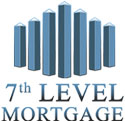Why Choose 7th Level for Insured Conventional Loans?
At 7th Level Mortgage, our insured conventional loans specialist will walk you through the process and help you to take advantage of the low rates and fees we offer in New Jersey, New York, Pennsylvania, Virginia, Maryland and Florida. Our representatives will guide you through the process and help you determine your conventional loan eligibility. Or if you prefer, you can use our home loan calculator in order to get a conventional loan today.
Conventional Loans
A conventional mortgage is a loan that is not guaranteed or insured by any government agency. It is typically fixed in its terms and rate.
Government agencies such as the Federal Housing Administration (FHA), the Farmers Home Administration (FmHA) and the Department of Veterans Affairs (VA) can insure or guarantee loans. The FHA is a part of the Department of Housing and Urban Development and insures residential mortgage loans made by private lenders. The FmHA provides financing to farmers and other qualified borrowers who may have trouble getting loans. VA loans are for veterans or members of the military and can have a lower down payment.
Mortgages not guaranteed or insured by these agencies are known as conventional mortgages. These mortgages adhere to Fannie Mae guidelines. Fannie Mae, or Federal National Mortgage Association, is a corporation created by the federal government that buys and sells conventional mortgages. It sets the maximum loan amount and requirements for borrowers.
Conventional loans are typically what everyone imagines when they think about home loans: you need a flawless credit score, the money to make the 10% down payment and you assume all of the responsibility. These seem like frightening financial thoughts for anyone to conjure, especially first time buyers.
To an extent, these are true, but they’re not as terrifying as they may appear. Yes, you do need a strong credit score to apply for a conventional loan, usually at least a 620 (740 is even better if you want to avoid higher mortgage payments). And yes, the down payment can be 10%, but the going rate is usually 5-20%. But don’t let these facts scare you. Conventional loans usually last 15-30 years, so as long as you maintain a strong record of employment and making payments on time, you will have nothing to worry about.
Usually, a conventional mortgage is a 30-year or 15 year fixed rate loan however adjustable rate mortgages are good alternatives for homeowners who do not intend to own the property after 5 to 7 years. That means it has a fixed interest rate for the 30 year term of the mortgage.
Conventional mortgages also typically require at least a 20 percent down payment. For example, if a house costs $200,000, the lender will provide a loan for 80 percent of that amount. So, $160,000 is financed through the lender and the borrower must pay $40,000 cash. However, in most cases, borrowers can obtain a conventional loan with as little as 5% down with private mortgage insurance.
Conventional loans are limited to $417,000 by Fannie Mae and Freddie Mac, the quasi-government agencies that buy mortgages from lenders, although the limit is higher in some high-cost areas. The rules vary depending on where you live, but the maximum financing you can get with an FHA loan is $625,500.
Basic Conventional Loan Requirements
- Must have a steady employment history or worked for the same employer for the past two years
- Must have a valid Social Security number, lawful residency in the U.S. and be of legal age to sign a mortgage in your state
- Must make a minimum down payment of 5 percent. The money can be gifted by a family member. Anything less than a 20% down payment will require Private Mortgage Insurance.
- Conventional loans are available for primary, secondary and investment occupancy
- Your front-end ratio (mortgage payment plus HOA fees, property taxes, mortgage insurance, home insurance) needs to be less than 36 percent of your gross income, typically. You may be able to get approved with as high a percentage as 43 percent. Your lender will be required to provide justification as to why they believe the mortgage presents an acceptable risk. The lender must include any compensating factors used for loan approval.
- Your back-end ratio (mortgage plus all your monthly debt, i.e., credit card payment, car payment, student loans, etc.) needs to be less than 43 percent of your gross income, typically. You may be able to get approved with as high a percentage as 49.99 percent. Your lender will be required to provide justification as to why they believe the mortgage presents an acceptable risk. The lender must include any compensating factors used for loan approval.
- Minimum credit score of 620 for maximum financing with a minimum down payment of 5 percent.
- Typically you must be four years out of bankruptcy or foreclosure and have re-established good credit.
For More Information on Conventional Mortgage Loans:
Note: By submitting your request, you grant permission for 7th Level Mortgage to contact you by email or by phone.
